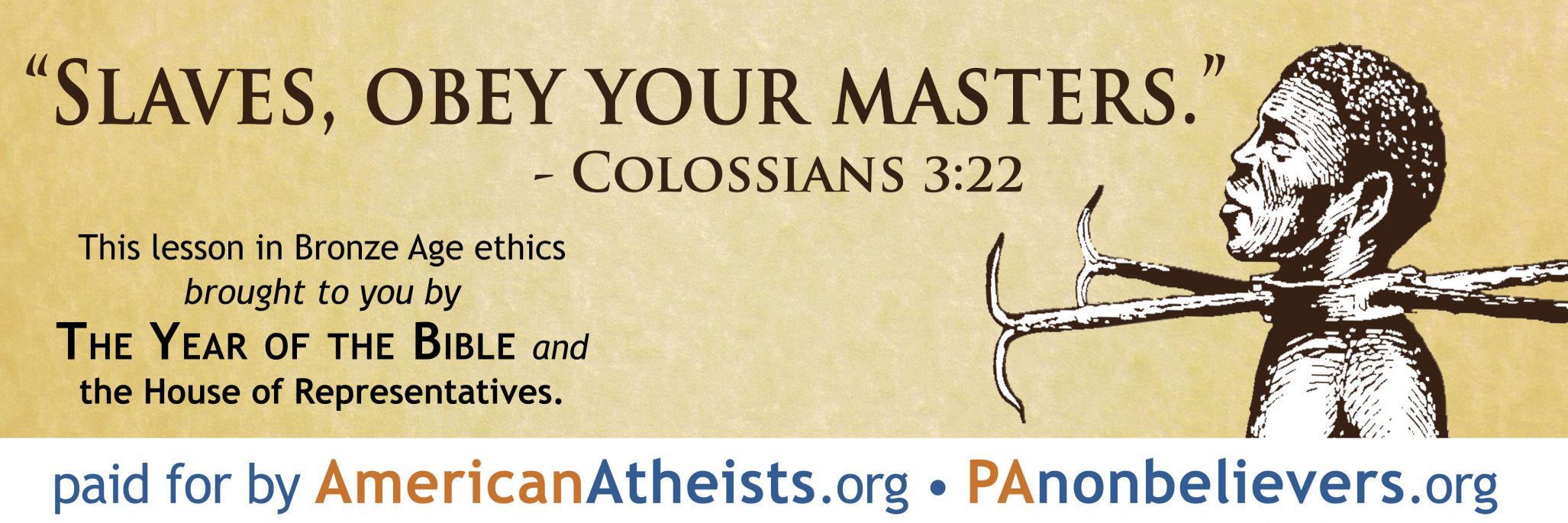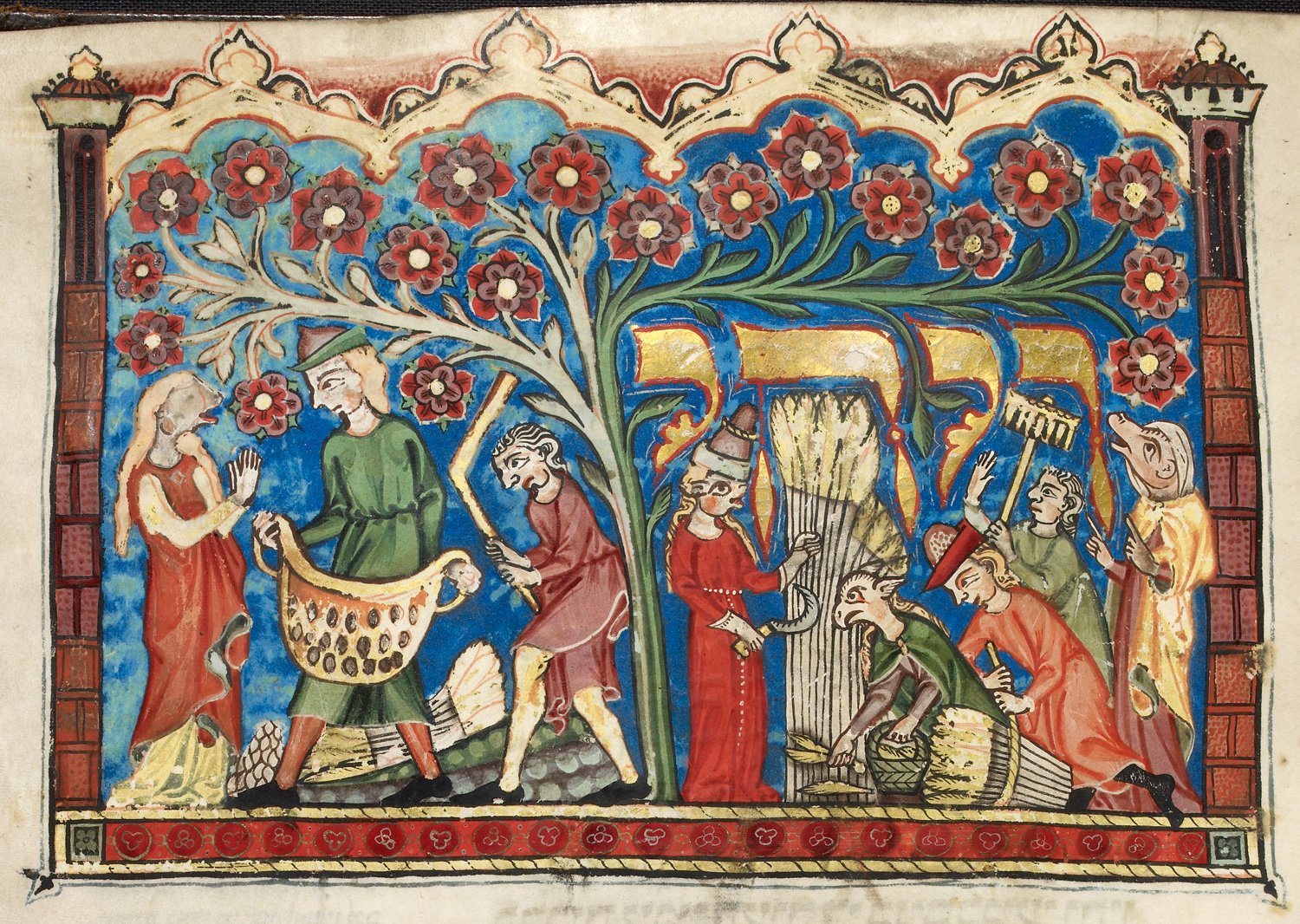Dear Brothers and Sisters in Christ:
Recently the Pennsylvania House of Representatives passed Resolution 535 proclaiming 2012 the “Year of the Bible”. In some circles of our community this has been very controversial. One of the most active protests has been made by American Atheists and Pennsylvania Non-Believers. Among their points of contention is that the Bible is the primary source of validation for all the major social ills of our history. To dramatize this point they hired a billboard dominated by a depiction of a very negroid featured black man wearing a large neck manacle, with the Biblical text “slaves obey your masters” in smaller print. The billboard was in a predominantly African-American community in Harrisburg. This caused another type of protest by citizens of that community and the city (my op-ed, while not printed by the newspaper, is available here).A representative from the American Atheists was interviewed shortly thereafter on local Public Television, and his anger with Christianity and the Bible was palpable. While his interpretation of the scripture texts was without regard for or knowledge of context, I was amazed that his literal knowledge of scripture seemed equal to persons who have been nurtured in a fundamentalist tradition. His vitriolic reaction to callers who differed with him, sometimes devolving into personal attacks, caused the host to question his behavior. As the conversation continued it was revealed that he had indeed grown up in a very fundamentalist, literal Christian tradition and in an unguarded moment intimated something of the hurt to him and his family.
I have no question that the best of our democracy, the inspiration for our rich artistic and cultural life, and also the historic movements to correct social and political injustices (which were often based upon misuse of scripture), have all been directly rooted in the Bible and Jewish and Christian Faiths. The Founding Fathers, even those who were Deists or non-practicing Christians, clearly found the Holy Scriptures a base of inspiration for their work. Like Jefferson regarding slavery, they also often found themselves conflicted between their political values and the Judeo-Christian values they sought to exploit in the political and economic compromises made to establish the Constitution. Besides the historic record of the Bible and our particular religious history as the inspiration for our democracy, there are independent sources such as Alexis de Tocqueville, the young French researcher who visited and wrote about the phenomenon of American Democracy. I doubt that there would be the strength of our democracy without the religious heritage which so greatly influenced our ideals, including a call to respect the religious faith (or non-faith) of others.
Having said the above, there is no question that the misuse of religion, particularly Christianity, has deeply hurt and even destroyed many. As I listened to the angry, bitter representative of American Atheists, my heart hurt for the pain he felt, the betrayal he clearly experienced and his estrangement from the God with whom he continues to invest his life’s energy to deny and debase. But his anger, and that of many, is more rightly directed to us…the Christian Community. Whether progressive or conservative, fundamentalist, evangelical or mainline—whatever our doctrine or tradition, in our efforts to “Love God with all our heart mind and strength” (cf. Mark 12.30) we too often have not Loved or shown a Godly respect for our neighbor. I believe the most difficult promise we make in the Baptismal Covenant is “…respecting the dignity of every human being.” This is especially true within our denominations and congregational communities. When we differ on theological or political views how do we treat one another in our differing? When persons are struggling with conflicts of Faith and their personal experience or need, do they sense from us our judgment or grace? Do we know how to speak truth with Love, knowing that Love is the only truth—for it instructs all other truths? Jesus’ chief command for the Christian community is found in John 15: “I give you a new commandment, that you love one another…by this shall the world know you are my disciples because you have love one for another.” Love (or the Greek word “agape”) does not mean agreement with one another or even warm affection for one another. It does mean seeing the other as someone loved by God; and that truth informs and shapes the character of life, even our conflicts, in Christian community. Without it we destroy one another, the integrity of the Church, and create spiritually wounded souls who, in their pain and anger, may never be reconciled again to the God of Love— until, I pray, they come to the nearer presence of God, who takes away not only the sins of the world but also the sins inflicted by the Church.
+Nathan






3 thoughts on “In Pennsylvania it’s the year of the Bible”
1) The bishop’s letter was excellent. (Especially 3rd paragraph.)
2) “Bronze Age”???
Regarding #2, I had noticed that as well. Not sure how that is relevant to either Old Testament/Hebrew Bible (the “older bits”) or the New Testament, which was cited in the ad.
I think a lot of people are confused about the differing concepts of slavery, comparing the Civil War era slavery concept to the time the bible was written concept. Look it up, it was NOT the same.